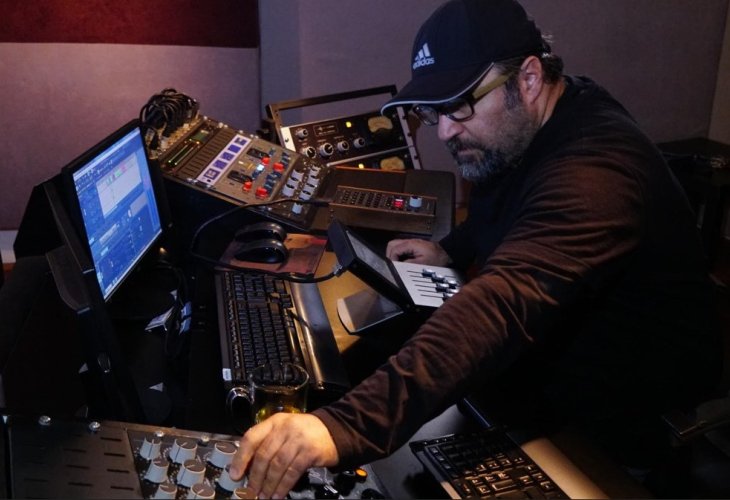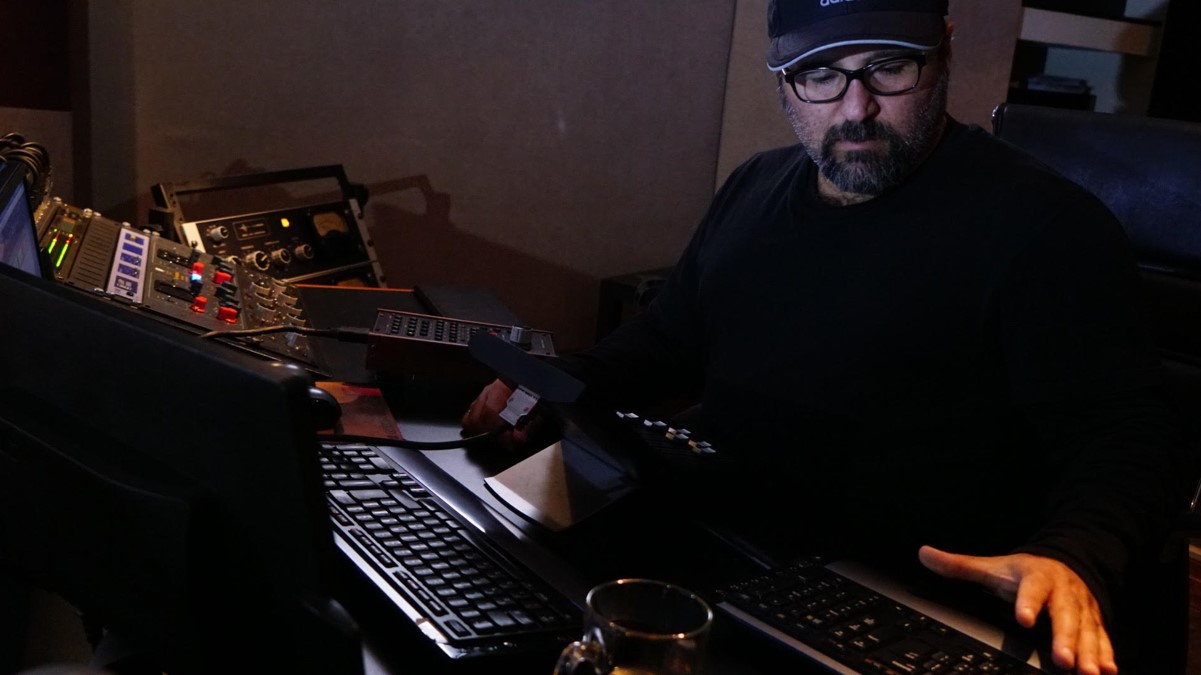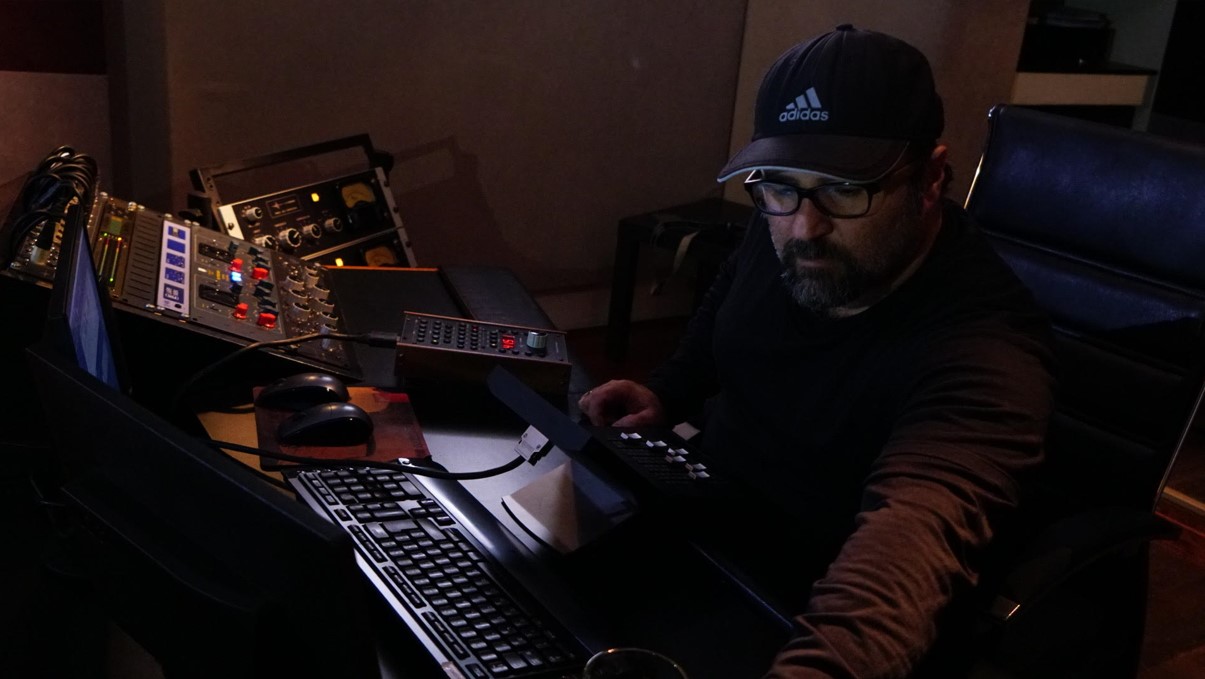"It's a Revolution": Interview with Producer Shmulik Daniel, a Veteran of the Israeli Music Industry
Producer Shmulik Daniel is responsible for numerous hits in both Israeli and Jewish music. In this interview, he shares moments when his childhood heroes recorded in front of his amazed eyes in his studio, the lost album of Amir Benayoun, and what Arik Einstein said about Shuli Rand's first album.
 (Photo Credit: Il Shafir)
(Photo Credit: Il Shafir)On the table at the entrance to Shmulik Daniel's studio, where a significant portion of Israel's top artists have recorded their songs over the past twenty-six years, I see a package of matzah. With a quick glance, I ask him about it, and he immediately replies: "Not long ago, Amir Benayoun and Itzik Kala were here. When Itzik came in, he brought a package of matzah and said, 'What's up with you, it's the second Passover. Enjoy.' And that's it, they have been here ever since. I like to remember that moment."
It seems it really touches you. How present was Judaism in the house you grew up in?
"In general, you could say that I grew up in a traditional home," says Daniel, 50, married and a father of four living in Holon, a music producer and arranger. "What reinforced this matter was that from a young age, I mostly grew up with my grandma. My mom invested a lot in her work, so I spent a lot of time with my grandma. Moreover, my family is very connected to the world of Torah. My Iraqi grandmother is a relative of Rabbi Ovadia Yosef, and my Egyptian grandmother is a descendant of Rabbi Yosef Karo. At my grandma's and also at my parents' home, they listened to Arabic, Israeli, foreign music, etc. There was a really wide variety."
"From a very young age, I was crazy about music. I would sit for hours listening to the details of the songs. I would try to break them down in my head into the different instruments I'm hearing and reconstruct them. Many times you know you're hearing a good song, but I wanted to deeply understand what makes it so good. I remember that even then, I realized there was someone actually orchestrating this whole event, that there's someone managing it. It doesn't happen by chance."
Shuli Rand - "Ayeka":
With this attraction, when did you establish your studio?
"I went through many stages in this matter, constantly learning more and more, but officially I established my own studio about 26 years ago. At first, it was both a recording studio and a rehearsal room because I didn't have enough work in the studio. Although, after five years, I stopped holding rehearsals here because there was enough work, but I have very beautiful and strong memories from that time."
Oded Menashery – "To the Last Sea":
"During that period, I had the most sought-after rehearsal room in the country, which really brought a lot of work and special encounters. One of them was during the country's fiftieth-anniversary celebrations, for which there was an exciting reunion of the Kaveret band. They did their rehearsals with me, and suddenly I'm spending days and nights with the musicians I grew up on. It was both a huge thrill, and I learned a lot from them. After that performance, they released a triple album, one of which contained recordings from the rehearsal room. When the album reached me, I saw they included a full-page picture of me, so I called them and said I was speechless."
David D'or and Tomer Hadadi – "Lo Gava Libi":
"The truth is it's exciting, but over the past few decades, quite a few of the country's top artists have been here. For example, Arik Einstein and Shalom Hanoch did rehearsals here for an album called 'Muscat,' and I also got to play drums on Arik Einstein's last album. Many people don't know this, but Arik Einstein and Amir Benayoun, who also recorded with me at that time, had very deep conversations about faith. When Shuli Rand's first album came out, Shuli went to Arik and gave it to him. A few days later, Arik called me and said Shuli's album is amazing and moving. Arik was someone who, if he had something good to say, wouldn't mind calling and complimenting."
You produced Amir Benayoun's songs from the start of his career. What can you share about the journey you both took?
"I have been working with Amir for almost 25 years. We have gone through a very long journey together. I've done seven albums for Amir so far, and we're currently working on a new and amazing album. I was lucky, and we met through a talented producer and dear friend named Nadav Biton when we produced his first album 'Rak At' together. When I met him, it was truly a wonder; it was so beautiful and original. It was a very powerful experience, there are many songs that were very successful, and among them, of course, 'Nitzachta Iti Hakol,' but in the end, Amir has countless gems in his albums. There are many songs I was involved in producing that didn't succeed for various reasons, or artists who, in general, didn't succeed, and it's very unfortunate to me, and I remember those even more than the successes."
 (Photo Credit: Il Shafir)
(Photo Credit: Il Shafir)At a certain point, Shuli Rand joined your musical creation, what works in the connection between the two of them?
"After Amir's sixth album, we found ourselves with a folder of ten of his amazing songs, but we decided Amir wouldn't sing them. That's how it felt right. And instinctively, Amir told me he thought it was suitable for an actor to sing them. A short time later, Amir saw the movie 'Ushpizin,' and said he wanted Shuli to sing the album. Amir called Shuli and told him he wrote him an album and wanted him to sing it. Shuli said he's an actor, not a singer, and that it's not suitable for him to sing. Amir didn't let go and told Shuli he watched him act and heard him interview, and it's clear he can sing, and that he's coming to him with the songs. After three days, Shuli called Amir and said: 'Forgive me, I didn't know who you are, I don't have radio or TV, and although now I know you're an amazing creator, I'm not a singer and can't sing the songs.'
Amir Benayoun – "Omed Bashaar":
"Amir didn't give up and brought Shuli to me. We started working on the songs, and we were blown away by what we heard. Shuli was insecure, but we felt it was exactly what we were looking for. We took a break for lunch, and during the meal, I told Shuli that I heard him in an interview recite some interesting text and asked him if he had more. He replied it was part of a song he wrote and composed, we asked him to perform it, and he did 'Mochin d'katnut' and said it was half in jest, a song for a show he wrote. We loved it very much, so we asked if he had more songs, and he replied that he had something, but it's depressing, and it's not worth bringing down the good atmosphere. Only after a little insistence, he agreed and did 'Ayeka,' and here we really got excited and realized we had a talented and unique creator with a language of his own, not just a performer."
Shuli Rand sings Amir Benayoun – "I Rediscovered":
"We set a further meeting for the three of us, the general idea was to include five songs by Amir and five by Shuli in the album, but due to disagreements, the project was halted, and Amir's songs returned to the folder on the computer. After a certain period, Shuli called me and said he wrote another five songs and wanted to let me hear them. The songs were amazing and original, and so we started on 'Nekuda Tova,' Shuli's first album. At first, Shuli said he wasn't a singer, but I, as someone who has seen so many singers, can say that I've been waiting all my life for a singer-songwriter like Shuli. Shuli dedicated himself to making the album incredibly and gave me true creative freedom. When I'm given freedom, I soar. It's often hard to know what will succeed and what won't, I've been surprised many times in life, but I had no doubt this was a groundbreaking album, one that was going to change Israeli and Jewish music."
Shuli Rand & Amir Benayoun – "When We Play":
The Broadcasts of the Revolution
Beyond being one of the leading and busiest producers in the country - Daniel has a particularly deep connection with many artists from the Jewish music genre - which makes hearing his words on the subject particularly interesting. "After many years of working with many creators, it's clear to me that artists who make Jewish music are artists for whom truth, language, and message are very important. In general, it's a correct and real engine for any artist, but in religious artists, I see it more strongly, and I have had the privilege of working with many talented artists in Jewish music, including Shuli Rand, Amir Benayoun, Aharon Razel, David D'or, Golan Azulai, Bini Landau, Yiftach Dekel, Omri Ben Akiva, Rabbi Gad Lior, Eliyah Gabay, Oded Israel, Yoni Genot, and more. And yes, it excites me especially to work on things related to Judaism. It touches my soul in a way that I can't explain any other way."
"I am very connected to Judaism. There are values I absorbed in my parents' home, and they guide me to this day. I love the holidays and celebrate them, and kashrut is also very important to me, both in what I eat outside and at home. In general, I'm sure it's no coincidence that many Jewish music artists come to me. It's tied to the strong connection I have with these materials. I believe Hashem is connected to everything, including my music."
 (Photo Credit: Il Shafir)
(Photo Credit: Il Shafir)"Regarding music, I want to add that when a religious artist shares his weak points, like in the song 'Ayeka,' it moves me even more. I feel the truth in a particularly powerful way. I feel it's not someone who's a kind of 'salesman' for religion, but a person speaking from his heart. Everyone knows not everything is rosy and glittery. In Shuli's first album, he often asked me: 'Make sure it's not missionary,' and I loved that approach. You can bring others closer when you come with truth and simplicity, not forcefully."
Original Jewish music has been experiencing significant growth in recent years. What do you think caused this?
"In my opinion, it's not just growth, but truly a revolution. In the last decade, the Israeli public as a whole listens to these songs and receives them with joy. It's connected to various reasons, but the main aspect, in my opinion, is that these are simply good songs by excellent artists. Many people in Israel connect to these contents and become more and more connected to Hashem, Judaism, spirituality, to themselves. It's not for nothing that the most significant creators in recent years are believing creators. People are looking for depth and meaning, not just superficial things. True, there's always pop music, and it succeeds, but the most serious filter for quality is time passing. When you hear a shallow hit, you say there's no way anyone will consider it relevant in a few years, but most believing creators aim to produce classics, not just hits. It's a big difference in thinking and execution. In my estimation, this music will only grow and flourish and bring a great blessing to Israel and the whole world."
Aharon Razel and Shuli Rand – "Oleh Bashevil":

